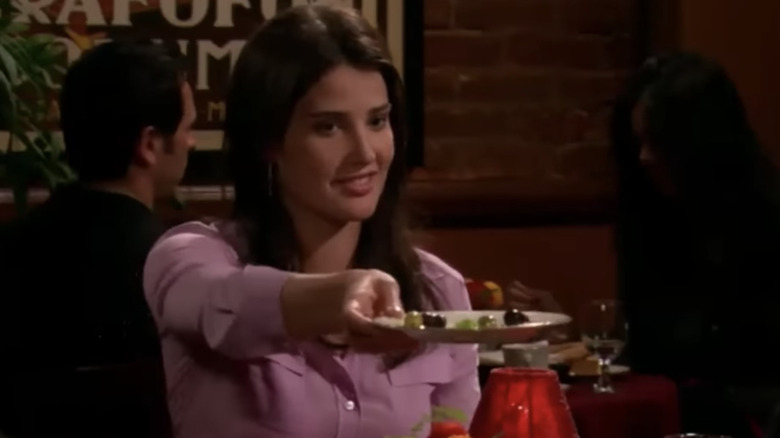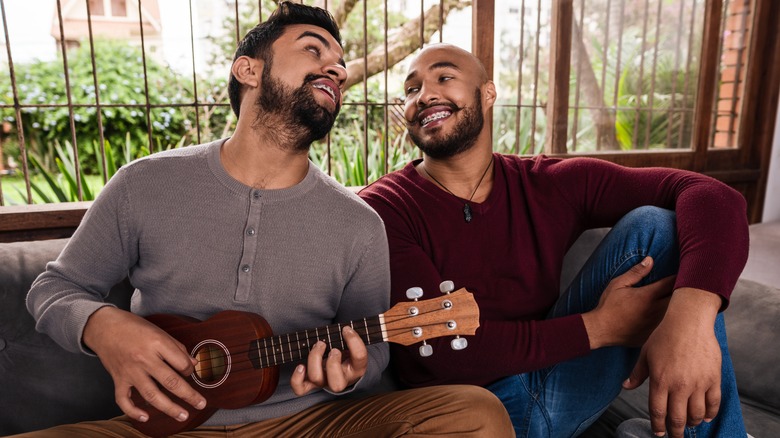Does How I Met Your Mother's Olive Theory Hold Up In IRL Relationships?
If you've been happily going about your life oblivious to the resurfacing of a theory about relationships inspired by the 2005 hit TV show "How I Met Your Mother" on TikTok, perhaps your only thought related to olives is if olive oil is good for your hair or not. But TikTok is a place for interesting trends and now olives are at the center of it. So here's a gist of the conversation so you can decide for yourself what you think.
Regardless of whether you're a fan of Ted Mosby, Marshall Eriksen, Robin Scherbatsky, or Lily Aldrin, "How I Met Your Mother" has inspired a lot of theories about love, one of which is the olive theory. Ted (played by Josh Radnor) explains to Robin (Cobie Smulders) that his best friends Marshall (Jason Segel) and Lily (Alyson Hannigan) are a "perfect balance" because Marshall hates olives and his partner Lily doesn't. "In a weird way, that's what makes them such a great couple," he adds in the scene.
The theory has since been analyzed differently because Marshall in fact admits to his friend Barney Stinson (Neil Patrick Harris) later on in the show that he doesn't really hate olives (he only said he did because he wanted Lily to have his olives). But the crux of the idea, at least on TikTok, seems to be about how opposites in a partnership could actually be a good thing. Does this theory hold in real life though?
Opposites attract can be a good thing as long as it's not related to your needs
There is a distinct difference between needs and wants in a relationship. While the former refers to life values, goals, beliefs, and principles you want to live by, wants are to do with interests, hobbies, and likes and dislikes. Needs are a lot more challenging to navigate, especially if both partners are on different ends of the spectrum. For example, if you want kids down the line and your partner is dead set against the idea, this could easily become a deal-breaker.
Matchmaker at Three Day Rule Lisa Elson told Well+Good that "so many people swipe left on someone because the interests listed don't match up with their own, when this really isn't what matters; it's the needs that matter." Since loving or hating olives definitely falls under the category of wants, it seems there might be some truth to the TikTok hype (and the "How I Met Your Mother" relationship rule). Enjoying different hobbies or having opposing palates can actually keep things interesting. They might also give you a healthy amount of individuality and autonomy within a partnership.
Life coach Pricilla Martinez told Elite Daily that opposites attract can also work in favor of a couple when two people are of different temperaments. "If I'm an anxious person, I want to be with someone who calms me rather than adding to my anxiety," she explained.
How to navigate the olive theory in real life
Approaching your partner's likes and dislikes with respect and curiosity is crucial if you find yourself in a situation where the olive theory holds true in your own relationship. Psychotherapist Rachel Wright told Well+Good, "You can appreciate what someone else is interested in without being interested in that specific thing yourself."
Having a partner who has different wants could also push you out of your comfort zone to experience new things, even if it's as simple as giving olives another chance. They could also add a refreshing take on particular life situations or challenges you encounter.
Martinez added that compromise in such situations becomes important too. "In the end, pursuing someone who is like you or your opposite is not as important as a shared philosophy around compromise."

